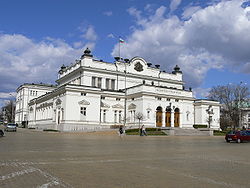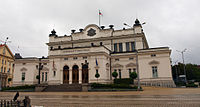- National Assembly of Bulgaria
-
National Assembly of Bulgaria
Народно събрание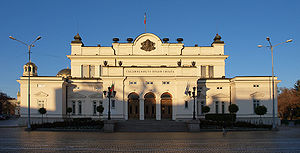
Type Type Unicameral Leadership Speaker Tsetska Tsacheva, GERB
since 14 July 2009Members 240 Political groups GERB (117)
BSP (40)
DPS (37)
Ataka (21)
BC (15)
RZS (10)Elections Last election Bulgarian parliamentary election, 2009 Meeting place National Assembly, Sofia Website http://parliament.bg/ The National Assembly of Bulgaria (Bulgarian: Народно събрание, Narodno sabranie) is the unicameral parliament and body of the legislative of the Republic of Bulgaria.
The National Assembly of Bulgaria was established in 1879 with the Constitution of Bulgaria.
Contents
Ordinary National Assembly
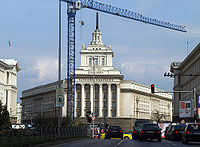 Office house of the National Assembly (Former House of the Communist Party of Bulgaria)
Office house of the National Assembly (Former House of the Communist Party of Bulgaria) The fist National Assembly of Bulgaria in Veliko Tarnovo
The fist National Assembly of Bulgaria in Veliko Tarnovo
Bulgaria 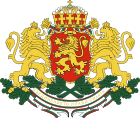
This article is part of the series:
Politics and government of
BulgariaConstitutionParliamentPresidentJudiciaryDivisions
The National Assembly consists of 240 members elected for a four-year term. 209 of the representatives are elected by proportional representation in multi-seat constituencies and 31 are elected in single-seat constituencies according to the last amendment of the Electoral law governing parliamentary elections, promulgated SG 36th edition on 15th of May 2009. Political parties must gather a minimum of 4% of the national vote in order to enter the Assembly. Bulgaria has a multi-party system. Obtaining of all state power by a single party is forbidden according to the articles of 1991 Constitution of Bulgaria.
The Assembly is responsible for enactment of laws, approval of the budget, scheduling of presidential elections, selection and dismissal of the Prime Minister and other ministers, declaration of war, concluding peace and deployment of troops outside of Bulgaria, and ratification of international treaties and agreements. It is headed and presided by the Chairperson of the National Assembly of Bulgaria.
The Assembly administers the publication of the State Gazette, Bulgaria's gazette of record.
Grand National Assembly
In addition to the ordinary National Assembly, a Grand National Assembly (Велико народно събрание, Veliko narodno sabranie) may be convened in order for matters of special jurisdiction, such as: 1) Adoption of a new Constitution; 2) Amendment of certain articles of the Constitution, e.g. those related with the basic civil rights; 3) Changes in the territory (gain or loss) of the Rebublic, etc. Before the World War II the Grand National Assembly was also competent in electing the Regency of the Bulgarian Kingdom if the tzar has not come to age. The First and the Third Grand National Assemblies also elected the first two Bulgarian monarchs after the liberation from the Turkish yoke - The Grand Duke (Knjaz) Alexander Battenberg and the Grand Duke (Knjaz) Ferdinand Saxe Coburg-Gotha.
As an organ, the Grand National Assembly was introduced with the Tarnovo Constitution of 1879, abolished in 1947 and reintroduced with the 1991 constitution. In different constitutional provisions, it was constituted by a different number of representatives. According to the 1991 Constitution, it consists of 400 deputies (as opposed to 240 in the ordinary one). The 1991 Constitution was adopted by the Seventh Grand National Assembly and was composed of 200 members being elected by proportional representation and the other 200 by majoritarian representation. The Constitution provides that the elections for Grand National Assembly shall be conduvted by the same manner as those for the Ordinary National Assembly.
A qualified majority of 2/3 during three voting procedures on separate dates is required for a decision to be made. The Grand National Assembly can also serve as an ordinary National Assembly, taking care of regular legislative activities, in urgent cases only. After it has concluded its work on the matter for which it was elected, the Grand National Assembly is dissolved ex lege and the President of the Republic shall appoint elections for an ordinary National Assembly.
A total of seven Grand National Assemblies have been in operation in Bulgaria, the last one from 10 July 1990 to 12 July 1991 adopting the current constitution.
Building
The National Assembly's main building has been proclaimed a monument of culture for its historic significance. Situated in downtown Sofia, it was designed in Neo-Renaissance style by Konstantin Jovanović, a Serbian-Bulgarian architect who received his education in Vienna and Switzerland and whose other works include the Parliament of Serbia building. It was constructed between 1884 and 1886 by Friederich Wilhelm Gustav Liebe, a young builder from Saxony who was only 22 years old when construction began.[1]
The building is depicted on the reverse of the Bulgarian 20 leva banknote, issued in 1999 and 2007.[2]
Due to insufficient space in the main building, some administrative offices of the National Assembly are now housed by the former headquarters of the Bulgarian Communist Party, located at the Largo.
Current composition (2009-2013)
This is the composition of the 41st (ordinary) National Assembly of Bulgaria as established by the Bulgarian parliamentary election in 2009.
Summary of the 2009 National Assembly of Bulgaria election results: Party Votes % +/– Seats +/– Citizens for European Development of Bulgaria 1,678,641 39.72 new 116 new Coalition for Bulgaria 748,147 17.70 −13.3 40 −42 Movement for Rights and Freedoms 610,521 14.45 +1.7 38 +4 National Union Attack 395,733 9.36 +1.2 21 ±0 Blue Coalition 285,662 6.76 −7.3 15 −22 Order, Law and Justice 174,582 4.13 new 10 new Lider 137,795 3.26 new — — National Movement for Stability and Progress 127,470 3.02 −16.9 — −53 The Greens 21,841 0.52 new — — For the Homeland 11,524 0.27 — — — Bulgarian Left Coalition 8,762 0.21 — — — Union of the Patriotic Forces 6,426 0.15 — — — Social Democrats 5,004 0.12 — — — Bulgarian New Democracy 3,813 0.09 — — — The Other Bulgaria 3,455 0.08 — — — Party of the Liberal Alternative and Peace 2,828 0.07 — — — Union of the Bulgarian Patriots 2,175 0.05 — — — National Movement for the Salvation of the Fatherland 1,874 0.04 — — — Total valid votes 4,226,194 100.00 — 240 — Invalid votes 97,387 2.25 — — — Votes cast (turnout: 60.20%) 4,323,581 100.00 — — — Registred voters 7,129,965 — — — — Source: Electoral Commission of Bulgaria Previous composition (1991-2009)
Summary of the 2005 National Assembly of Bulgaria election results: Coalitions and parties Votes % Seats +/− Coalition for Bulgaria - Bulgarian Socialist Party
- Party of Bulgarian Social Democrats
- Political Movement Social Democrats
- Agrarian Union "Aleksandar Stamboliyski"
- Civil Union "Roma"
- Movement for Social Humanism
- Green Party of Bulgaria
- Communist Party of Bulgaria
1,129,196 31.0 82 +34 National Movement Simeon II 725,314 19.9 53 −67 Movement for Rights and Freedoms 467,400 12.8 34 +13 National Union Attack - National Movement for the Salvation of the Fatherland
- Bulgarian National Patriotic Party
- Union of Patriotic Forces and Militaries of the Reserve Defense
296,848 8.1 21 +21 United Democratic Forces - Union of Democratic Forces
- Democratic Party
- Bulgarian Agrarian People's Union
- George's Day Movement
- National Association - Bulgarian Agrarian People's Union
- Movement for an Equal Public Model
280,323 7.7 20 −31 Democrats for a Strong Bulgaria 234,788 6.4 17 +17 Bulgarian People's Union - Bulgarian Agrarian People's Union-People's Union
- IMRO - Bulgarian National Movement
- Union of Free Democrats
189,268 5.2 13 +13 Others 324,050 8.8 0 - Total valid votes 3,648,177 100.0 240 - Invalid votes 99,616 Votes cast (turnout: 55.8%) 3,747,793 Registered voters in the main list 6,720,941 Source: Electoral Commission of Bulgaria and Adam Carr's Electoral Archive Summary of the 2001 National Assembly of Bulgaria election results:
Party Votes Seats National Movement Simeon II 1,952,513 120 United Democratic Forces 830,338 51 Coalition for Bulgaria (Bulgarian Socialist Party) 783,372 48 Movement for Rights and Freedoms 340,395 21 Summary of the 1997 National Assembly of Bulgaria election results:
Party Votes Seats United Democratic Forces 2,223,714 137 Democratic Left (Bulgarian Socialist Party) 939,308 58 Union for National Salvation (Movement for Rights and Freedoms) 323,429 19 Euroleft 234,058 14 Bulgarian Business Block 209,796 12 Summary of the 1994 National Assembly of Bulgaria election results:
Party Votes Seats Bulgarian Socialist Party 2,262,943 125 Union of Democratic Forces 1,260,374 69 Bulgarian People's Union 338,478 18 Movement for Rights and Freedoms 283,094 15 Bulgarian Business Block 245,849 13 Summary of the 1991 National Assembly of Bulgaria election results:
Party Votes Seats Union of Democratic Forces 1,903,567 110 Bulgarian Socialist Party 1,836,050 106 Movement for Rights and Freedoms 418,168 24 Notes
External links
- Народно събрание на Република България/ National Assembly of the Republic of Bulgaria, Official website
- Bulgaria The National Assembly
- Historical photographs of the National Assembly
Parliament of Europe Sovereign
states- Albania
- Andorra
- Armenia
- Austria
- Azerbaijan
- Belarus
- Belgium
- Bosnia and Herzegovina
- Bulgaria
- Croatia
- Cyprus
- Czech Republic
- Denmark
- Estonia
- Finland
- France
- Georgia
- Germany
- Greece
- Hungary
- Iceland
- Ireland
- Italy
- Kazakhstan
- Latvia
- Liechtenstein
- Lithuania
- Luxembourg
- Macedonia
- Malta
- Moldova
- Monaco
- Montenegro
- Netherlands
- Norway
- Poland
- Portugal
- Romania
- Russia
- San Marino
- Serbia
- Slovakia
- Slovenia
- Spain
- Sweden
- Switzerland
- Turkey
- Ukraine
- United Kingdom
- (England
- Northern Ireland
- Scotland
- Wales)
States with limited
recognition- Abkhazia
- Kosovo
- Nagorno-Karabakh
- Northern Cyprus
- South Ossetia
- Transnistria
Dependencies
and other territories- Åland
- Faroe Islands
- Gibraltar
- Guernsey
- Jan Mayen
- Jersey
- Isle of Man
- Svalbard
Other entities - European Union
Categories:- 1991 establishments
- Parliaments by country
- Government of Bulgaria
- Buildings and structures completed in 1886
- Unicameral legislatures
Wikimedia Foundation. 2010.


